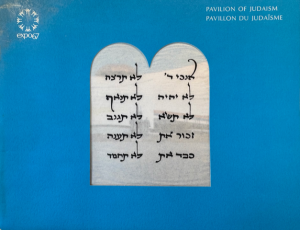MONTREAL — An historic moment in Montreal Jewish community life more than three years in the making is nigh as the first eruv to transverse Decarie Boulevard prepares to open.

MONTREAL — An historic moment in Montreal Jewish community life
more than three years in the making is nigh as the first eruv to
transverse Decarie Boulevard prepares to open.
The west-end Snowdon eruv, according to prime mover Rabbi Schachar Orenstein of the Spanish & Portuguese synagogue, will allow ritually observant Jews in the district to carry objects or push baby strollers back and forth across Decarie on Shabbat and on Yom Kippur.
But for complicated halachic reasons, the Decarie crossings will be “kosher” at two bridge points only: Plamondon Avenue and Bourret Street.
“This is the seventh eruv in the city, but it’s the first to ever cross that street,” Rabbi Orenstein said. “I think there was a sort of psychological obstacle to having an eruv there.
“But it’s really an amazing feeling and I’m elated” he said. “People will be able to cross Decarie to visit patients at the Jewish General Hospital. It’s such a large project and really good news.”
The two-square-kilometre eruv – expected to be in full operation within the next few weeks – is roughly bounded by Trans Island Avenue to the west, Jean-Talon Street to the north, Legare Street to the east (but encompassing the Jewish General Hospital), and Queen Mary Road to the south.
The eruv will also be contiguous with the large eruv in Hampstead/Cote St. Luc.
The other eruvim on Montreal island are in Westmount, Outremont, the De Vimy Street area, Ville St. Laurent, and Dollard des Ormeaux in the West Island.
Rabbi Orenstein said constructing the Snowdon eruv has proved to be a technically and halachically daunting task, requiring rabbis, engineers and architects, as well as the co-operation of residential and commercial property owners whose permission was needed to affix either a heavy-gauge fishing line or to mount rabbinically acceptable “poles” (wires attached to plexiglass backings).
About 20 years ago, an effort was made to operate an eruv under the auspices of the Vaad Ha’ir covering all of Montreal proper, but it was eventually forced to close due to frequent breaches and exorbitant maintenance costs.
Since then, smaller eruvim have sprung up on an ad hoc basis in areas where Jewish numbers warrant. The Vaad was not involved in the one in Snowdon, but representatives are being invited to a planned launch.
Rabbi Orenstein noted that organizers of the Snowdon eruv were so determined to make it unquestionably kosher that Rabbi Herschel Schachter, rosh yeshiva of New York’s Yeshiva University, came in to lend his expertise.
“For something like this, you want the biggest expert available” he said.
All in all, Rabbi Orenstein said, the Snowdon eruv is made up of fishing and power lines, existing fences and wooden beams – an interconnected whole whose contiguousness cannot be compromised.
Even at The CJN’s deadline, with the eruv effectively complete, organizers were making sure that a final needed “permission” from a property owner was in hand and that a recalcitrant wire that kept coming down would stay in place.
“But it is going to happen,” Rabbi Orenstein assured, as will a planned community event to mark the occasion.
Key figures involved in organizing the Snowdon eruv have included Rabbi Michael Whitman of Adath Israel-Poale Zedek Congregation, who is responsible for the Hampstead/Cote St. Luc eruv, and Rabbi Yonah Rosner, whose Congregation Shomrim Laboker is also within the eruv.
Other Jewish community institutions within the new eruv include Rabbi Orenstein’s Spanish & Portuguese (which now includes Rabbi Emanuel White’s Chevra Shaas Adath Jeshurun Congregation), Congregation Zichron Kedoshim, the Jewish Hospital of Hope, Jewish Eldercare Centre, the Grand Rabbinat du Québec and the YM-YWHA.
Rabbi Orenstein said initial construction of the eruv has cost about $16,000, with ongoing maintenance expected to be upward of $9,000 a year, to be raised through fundraising.
“It’s been a real group effort,” Rabbi Orenstein said.
Details on Montreal-area eruvim are available at www.eruvmontreal.org.






